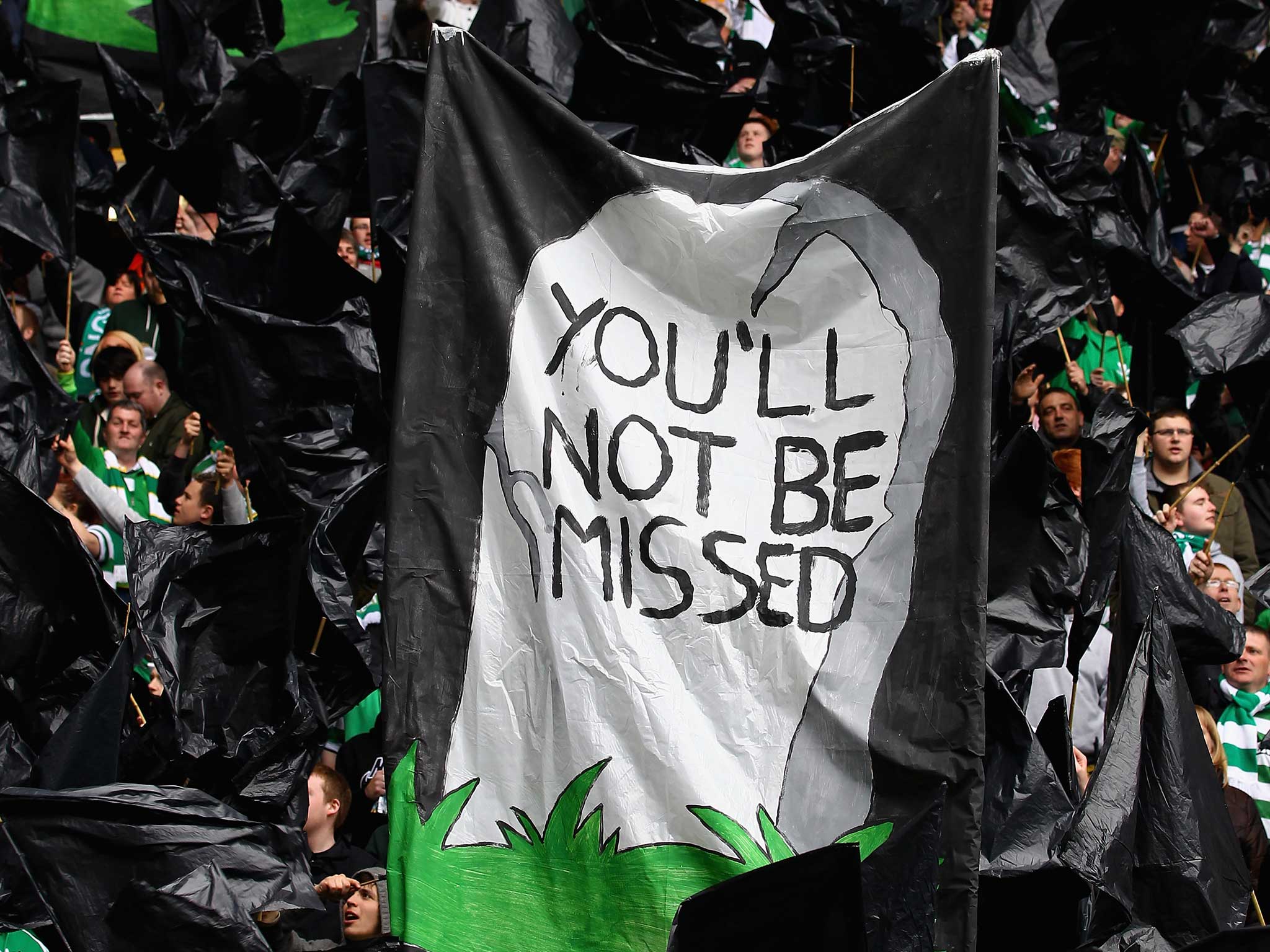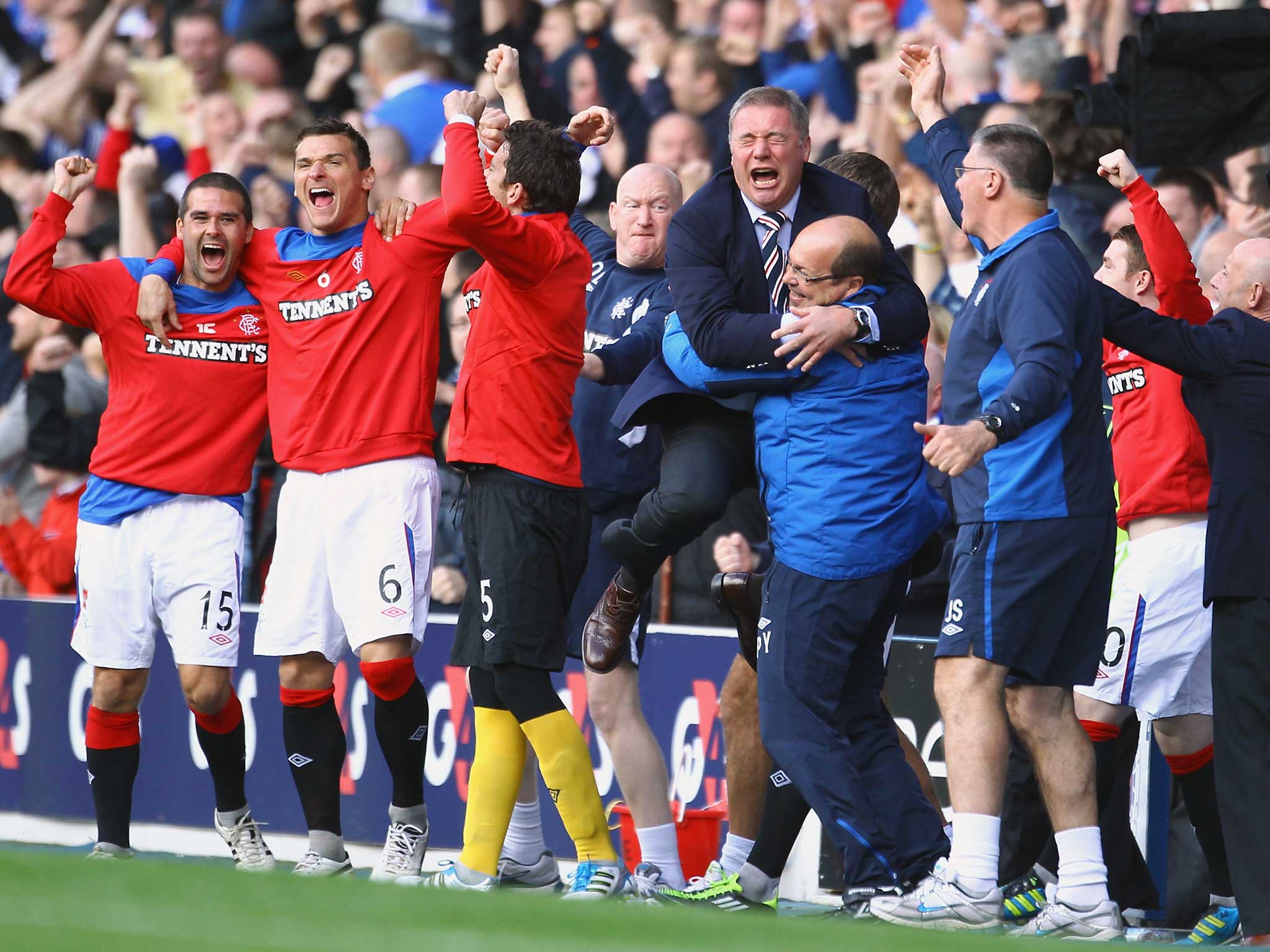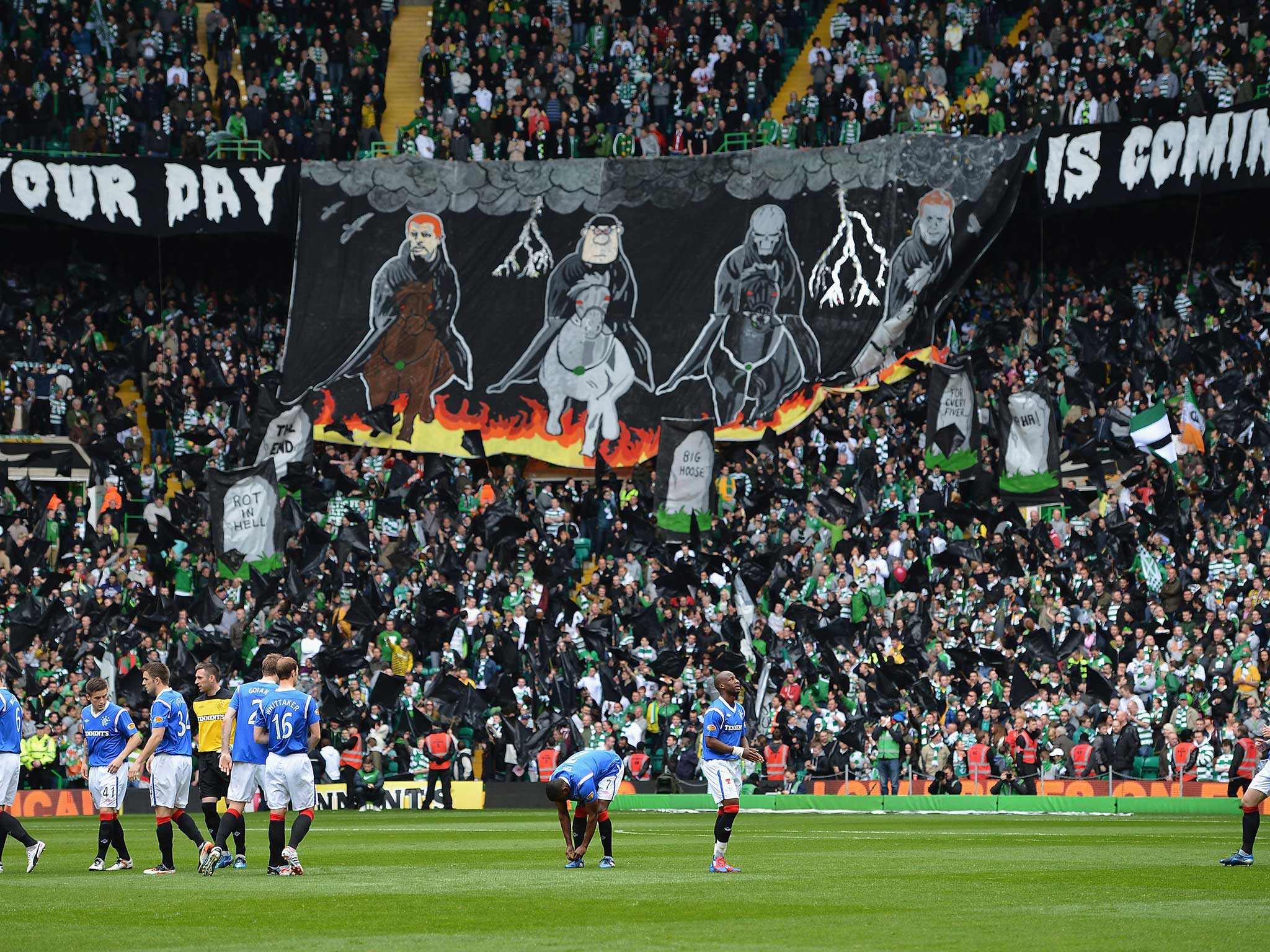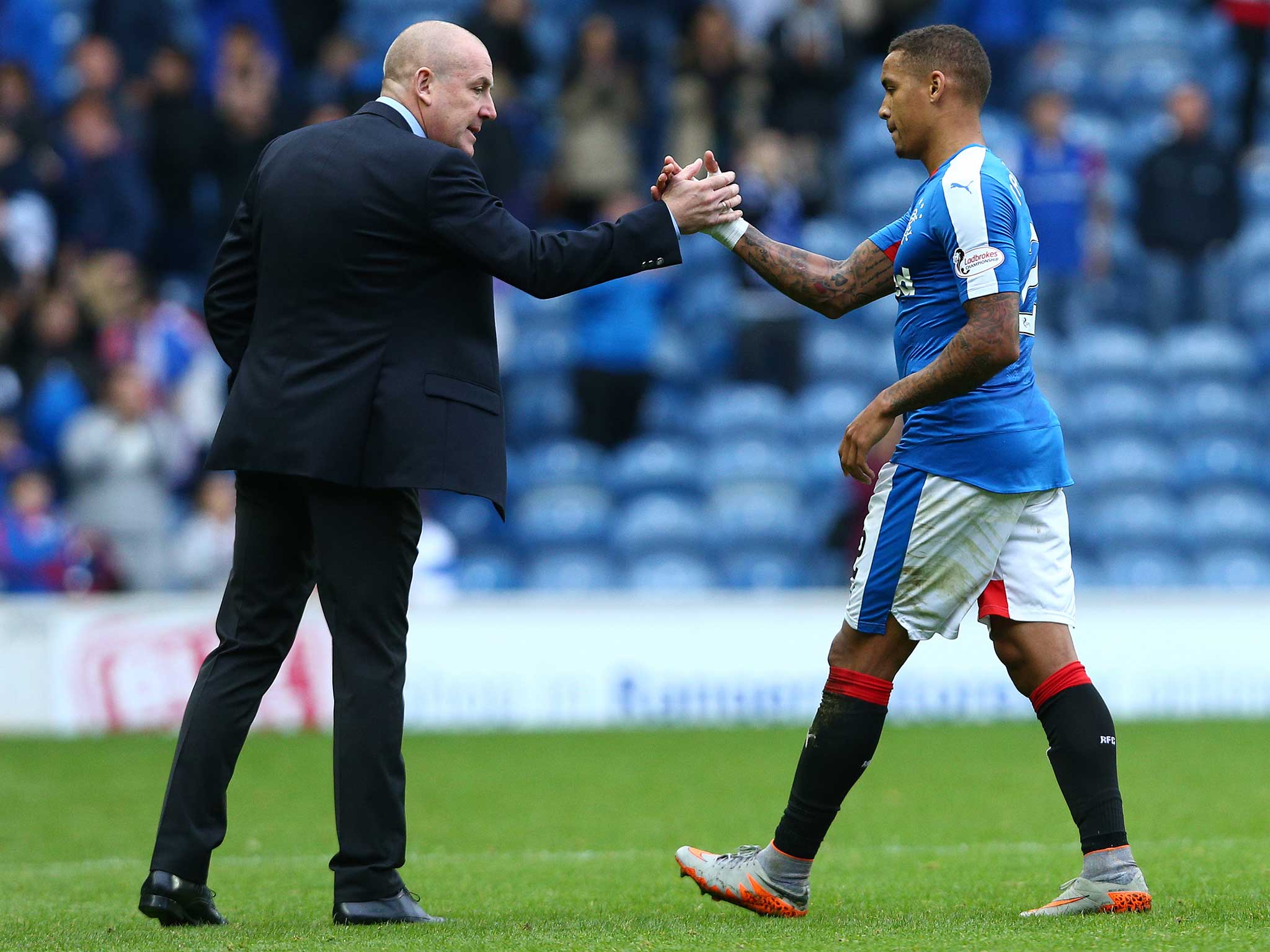Old Firm derby: Don't let Celtic fool you - they are glad that Rangers are back in the Scottish Premiership
Getting home from the Celtic match to see how ‘the other lot’ got on is a part of life again, though few of a Parkhead disposition dare admit it, because it cuts across the ritual enmity for Ibrox

Your support helps us to tell the story
From reproductive rights to climate change to Big Tech, The Independent is on the ground when the story is developing. Whether it's investigating the financials of Elon Musk's pro-Trump PAC or producing our latest documentary, 'The A Word', which shines a light on the American women fighting for reproductive rights, we know how important it is to parse out the facts from the messaging.
At such a critical moment in US history, we need reporters on the ground. Your donation allows us to keep sending journalists to speak to both sides of the story.
The Independent is trusted by Americans across the entire political spectrum. And unlike many other quality news outlets, we choose not to lock Americans out of our reporting and analysis with paywalls. We believe quality journalism should be available to everyone, paid for by those who can afford it.
Your support makes all the difference.It is the return of an old 5.30pm Saturday ritual to households across Glasgow which tells the truth that dare not speak its name for Celtic fans: they are glad Rangers are back.
Getting home from the Celtic match to see how ‘the other lot’ got on is a part of life again, though few of a Parkhead disposition dare admit it, because it cuts across the ritual enmity for Ibrox. The Celtic assistant manager John Collins said this week that his club would never get credit for being champions until Rangers were in the top flight and he got stick for what sounded like too much of a welcome.
One Celtic blogger told Collins that it was a competitive Scottish Premiership that the club needed, not Rangers, but the league tables of the past four years reveal that to be a pipe dream. The closest any side has come to Celtic was Aberdeen last season, when they finished 15 points adrift. Motherwell were runners-up for two years, first 16 and then 19 points adrift.
It’s not just four Old Firm league games which have been missing each season, but any suspense or drama surround Celtic’s games, week-to-week. The new landscape of Scottish football has included the top tier at Parkhead being regularly closed and the value of the Sky TV deal has been frozen while it was soaring in England.
It was considered generous when Sky said they would lock the TV deal in 2011/12, the year Rangers were sent down to the bottom division, on the understanding that they would come straight back up in four years, which they have been a year late in doing.
The problem with getting to the bottom of whether Celtic might feeling something like pleasure or relief at the enemy’s return is the gulf between reality and what the club can say publicly without risking the opprobrium of their fans.
The truth is that Celtic were never the ones who wanted Rangers bumped down to the bottom level, even though the tax avoidance practice which sank them and left with an HMRC tax demand they couldn’t pay – the Employment Benefit Trust - was used to keep pace with their foe. Senior insiders from Rangers’ period in the wilderness, say that it was the smaller clubs, angered and irritated by the perceived arrogance of the Celtic/Rangers duopoly, who were determined to punish the Ibrox club by sinking it.

“It was retribution for decades of perceived arrogance,” one source told The Independent. “It was: ‘Here is our chance to stick it to Rangers.’” Some clubs did that transparently, others by asking their supporters what they wanted Rangers’ fate to be - as if they really needed to.
The beneficiaries of a decision which, from a Celtic perspective, made no economic sense, have been those sides in the lower reaches of the Scottish pyramid, some of whom were not even semi-professional.
The pulling power of Rangers in those divisions was extraordinary. One club told Rangers executives that it would be able to buy a new hospitality suite on the basis of playing them twice home and twice away in the Division 3 season of 2012/13. But of all the Division 3 clubs it was Queens Park who benefitted most, as they could accommodate more than 30,000 Rangers fans for their games at Hampden Park that year.
It was retribution for decades of perceived arrogance. It was: ‘Here is our chance to stick it to Rangers.
Queens Park told Rangers that the revenue generated by their four games against them in 2012/13 earned them the equivalent of five years of commercial revenue. Temporary stands were regularly being built by Division 3 and 2 sides to accommodate to Rangers supporters.
With no narrative in Scotland’s top flight, the Sky cameras continued to follow Rangers around. In 2013/14 they were the second most televised club, after Celtic, despite being in the second tier. Beyond Celtic and Rangers, the commercial value of the clubs has remained so small that Aberdeen, Motherwell and others can hardly be criticised for not making hay while Rangers were away.
Celtic’s total earnings, including TV money, for winning the Premiership, has been around £3m. For coming second, Aberdeen have barely claimed £500,000. The financial disparity has made it far harder to shatter the duopoly as Alex Ferguson’s Aberdeen did in 1980.

With comparatively little TV money, clubs beyond the Old Firm have needed to rely on the traditional income streams – gate receipts, commercial revenue and sponsors. Where ticketing is concerned, there has not been a huge amount of imagination shown among the lesser clubs in the past four years, through the use of bundled deals or incentives.
But there is not a huge match-attending audience to draw on. Aberdeen attracted a little over 11,000 for the more recent home game against Partick Thistle. The commercial environment has been moribund. There was no sponsor for the Scottish League Cup at one stage.
The earning gulf between the Premiership and the Premier League, incidentally, renders redundant any discussion of Old Firm clubs currently holding their own in England’s top league. In 2013/14, Rangers executives were seeing relegated English Premier League side command £68m in revenue while the best Scottish club side collected £3m.
Among those who have taken heaviest criticism for expressing a wish that Rangers make it back in a hurry is Celtic’s largest shareholder, Irish billionaire Dermot Desmond. A few months after Rangers were ordered to start again in the fourth tier following their 2012 liquidation, he spoke of them “as a fantastic club with a great history”, of being “disappointed” they did not share the same league set-up as Celtic, and of how he was sure it wouldn’t “be long” before they were back.

This brought a furious backlash in some Celtic chatrooms. The received wisdom among Celtic supporters is that Rangers post-2012 are a new club with no history beyond four years ago.
Yet the significance of Rangers’ re-emergence was evident in details, published by The Scotsman this week, of how the catalyst for hiring Brendan Rodgers as manager was the outlandish way Rangers directors celebrated when their club beat Celtic in last season’s Scottish Cup semi-final penalty shoot-out.
It was Desmond’s fury about the way usual etiquette was dispensed with ultimately convinced him that he must “go large” – sacking manager Ronny Deila and “upscaling” with Rodgers, with the heavy lay-out that entailed.
Under the five-year plan Rangers put together in the wilderness, they had anticipated a league match with Celtic coming one year before it has. That same five-year plan legislated for the first season back in the Premiership being one in which they would be merely “competitive.” The 2017/18 and 2018/19 seasons are when the target is to “challenge” Celtic for the title. Where these two inveterate foes are concerned, though, one day is too long to wait, let alone 12 months.
Join our commenting forum
Join thought-provoking conversations, follow other Independent readers and see their replies
Comments